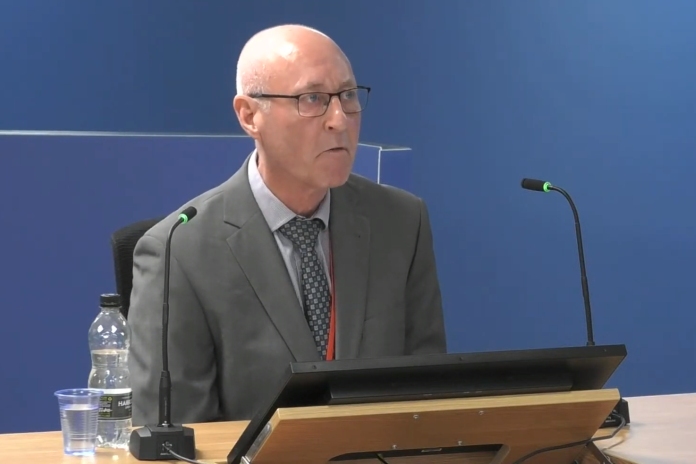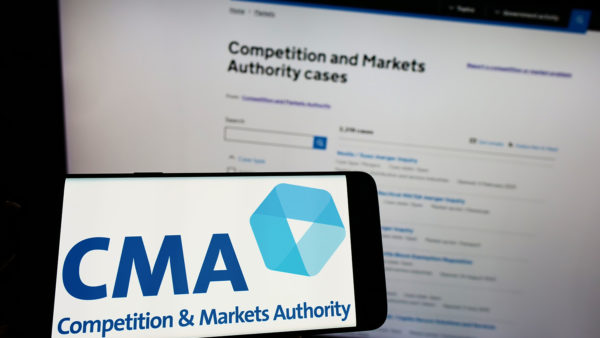
Kensington and Chelsea Tenant Management Organisation’s (TMO) discussions with Grenfell Tower refurbishment main contractor Rydon prior to the announcement of a preferred bidder for the project were “completely contrary” to legal advice, its former head of capital investment has admitted.
David Gibson, now retired, made the admission to lead counsel to the Grenfell Tower Inquiry Richard Millett QC during his evidence this week.
Millett probed Gibson on what the TMO discussed with Rydon prior to the announcement of a preferred bidder in 2014.
Rydon had submitted a bid of £9.2m for the project, £600,000 lower than any of its rivals, but the TMO only had a budget for the project of £8.4m.
Gibson explained that the TMO wanted to discuss with Rydon how it had entered into a contract over its budget and to try to “clarify” with the contractor that it was “comfortable” using value engineering clauses within the contract to overcome this difficulty.
He confirmed that discussions began before a preferred bidder was announced and that the TMO wasn’t having the same conversations about value engineering with any other bidder.
Millett asked: “How could it have been proper to have any of these discussions about price reductions with Rydon alone and not having those discussions with any of the other bidders?”
Gibson said he was clear that during interviews with the prospective contractors that if a question was asked of one contractor, the same question had to be posed to all of them.
Millett replied: “Surely it would have followed in your mind at the time that, if you were going to have discussions about value engineering with one of those bidders, you would have to have them with all.”
Gibson replied: “No…I think we were in an uncomfortable position, but we couldn’t talk to three contractors, that would not be allowed. We were trying to clarify a process at this point…The problem was that Peter [Maddison, director of assets at the TMO] needed to get information for his board report, and we needed to be sure that Rydon were comfortable with our approach. We were trying to agree a process with them and get an understanding from them that they were agreeable…we would enter into a contract at a higher figure, and we would use the value engineering clauses to then work out how we bridge that gap.”
Gibson sent an email to Rydon refurbishment manager Steve Blake on 13 March 2014 saying that the TMO was seeking savings of £800,000 including the cladding savings already priced and requested a meeting.
Millett asked: “Do you accept that the thrust of this email was to tell Rydon that they had to come down further from their bid price?
Gibson replied: “No.”
Millett continued: “Well, can you explain what you meant when you said that you were indicating ‘areas we would like you to look at in relation to possible savings’? Savings, surely, over and above the £9.2m that they’d bid?”
Gibson said: “I was giving them enough information to try and explain what the problem was so that there were areas they would be looking at. My wording might be slightly bad, but the intention was to clarify the process, but being as open as possible with them on what the gap was, what we’ve identified, and asking them to look at all the areas.”
Millett asked Gibson if it didn’t occur to him that the £8.4m budget the TMO had was too low for the project it wanted.
Gibson said: “No. I think that we were actually quite pleased when we saw the Rydon tender submission figures because it wasn’t as big a gap as we thought there might be, and we thought: this is something that we can make work.”
Offline meeting
The hearing heard how a meeting between Blake and Gibson took place on 18 March at the TMO’s offices to discuss an approach. No records of the meeting, which Gibson described as “offline”, were kept.
Millett asked: “Why wasn’t it recorded? It was important.”
Gibson said: “I think what we wanted was an understanding.”
Millett replied: “What you wanted was a secret understanding that was not discoverable by anybody else, least of all the other bidders. That’s right, isn’t it? Can you not accept that?”
Gibson said: “It was an offline meeting, yes.”
During the meeting Rydon “agreed they were comfortable in being able to identify and bridge the gap between the two sets of figures”. Gibson said: “We wanted assurance that they were comfortable with our approach.”
Inquiry chair Sir Martin Moore-Bick intervened in the questioning to ask: “It wasn’t just comfortable, was it? Because you made it quite clear in the spreadsheet that what you needed was a reduction in cost of the project achieved by a change in specification.”
Gibson said: “I don’t think we were changing the specification necessarily at this time.”
Moore-Bick replied: “Well, wasn’t that the underlying premise? You were asking them to concentrate on particular areas where the existing specification could be modified in order to produce a saving in the cost of the project. You see, I asked the question because a little while ago you said what you wanted to discuss with them was process. But actually what you wanted to discuss was the application of a process. You were interested in the outcome of the process, not just the process, weren’t you?”
Gibson replied: “Yes.”
Legal advice ignored
Millett went on to read out legal advice from Towers & Hamlins given to the TMO which stated that having advertised the contract as a restricted procedure based on a contract value of £8m-£10m, “KCTMO is required to assess the tenders based on the price/quality criteria you have set out in the tender documents. The restricted procedure does not permit a contracting authority to undertake negotiations with the tenderers prior to contract award, and does not provide for the contracting authority to revise the tender document or for tenderers to submit revised ’best and final offers’.”
It warned that to do so would be a breach of EU Regulations.
Trowers & Hamlins added: “Your only EU-compliant options are to assess the tenders and award the contract to the tenderer who scored the highest based on your price/quality criteria, or not award the contract and run a new procurement exercise. If the contract allows it, you may run value engineering exercises with your selected tenderer, but only once the contract has been entered into.”
Millett asked Gibson if he had read and understood the advice from Towers & Hamlins. Gibson confirmed he had.
Millett asked if the TMO’s subsequent decision to discuss the approach with Rydon and also to discuss figures by way of value engineering was “completely contrary to the clear legal advice that it received from Towers & Hamlins?” Gibson agreed that it was.
But he did not agree that Rydon received preferential treatment.
Millett said: “Well, they were told that they were in pole position, and they were given a chance to produce value engineering figures before notification in circumstances where the others were not. Does that not tell us that Rydon was given preferential treatment?”
Gibson: “No, it does tells us that we followed a process in assessing the tenderers to get to a preferred contractor status, and it tells us that we had identified a problem, we had taken legal advice, we were looking at a way to overcome the problem. I think it’s quite clear.”
The Inquiry continues.
Comments
Comments are closed.










This is what every Construction Manager serving every client with a budget does every time with or without the support of the project consultants.
Is Construction on trial here?
Why not the Ministers that approved Class 0 cladding?
Will the lawyers ever get to them?